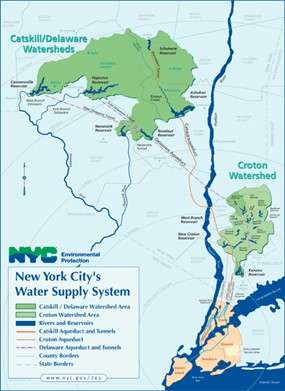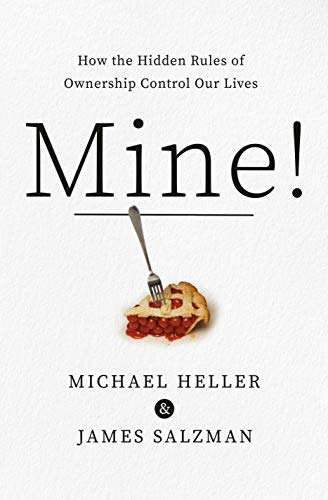The Volokh Conspiracy
Mostly law professors | Sometimes contrarian | Often libertarian | Always independent
Why Do We Need More Ownership to Protect the Environment?
How "as if" ownership engineering ensures safe drinking water and battles climate change.
This post is adapted from our new book, Mine!: How the Hidden Rules of Ownership Control Our Lives, available March 2. To learn more about the book, visit minethebook.com.

Yesterday, we introduced Al Appleton and showed how he persuaded New York City to invest in green rather than gray infrastructure, trees instead of concrete. The result: impressively clean drinking water. Today, we explain what all this has to do with ownership.
We tend not to think about ownership when talking about the environment. The benefits we receive from nature—the clean air we breathe, a stable climate, fish schooling in the ocean, scenic vistas across landscapes—seem like they must be goods common to all. That's a lovely notion, but it's also a problem.
Common ownership works well when resources are abundant, but often fails as populations grow and technology changes. When valuable resources are free for the taking, we tend to take too much. The result of common ownership is that we're overfishing the world's oceans, cutting down tropical forests, and over-using the atmosphere by emitting greenhouse gases at historically high levels, driving climate change. At this rate, the world of our children and grandchildren will be very different from the one we grew up in, and not for the better.
Just as the Catskills watershed provides clean drinking water, nature provides all kinds of critical services that we take for granted. Insects pollinate our crops. Microbes in soils break down waste and create fertile fields for farming. Coastal marshes protect against storm surges and provide habitat for young fish. These are all examples of common resources that benefit everyone and are owned by none. We all enjoy the wild birds and butterflies flying around us. But the people whose lands provide the habitat for this wildlife receive no compensation in exchange. If they don't own the resources and can't charge for them, then they have little reason to protect or invest in them.
Wetlands, for example, may protect towns by slowing storm surges or filtering drinking water. If landowners convert wetlands into homes or farms, they may benefit financially but the community is made far worse off by flooding and dirty water. Because no one owns wetlands' services like flood prevention and water purification, landowners don't take the value of those services into account when deciding how to use their land. If the choice is to earn a living by farming the wetland or earn nothing by preserving it, then the choice is simple. Fill the wetland.
Appleton's great insight was to innovate around ownership design. He told Catskills landowners that New York City would deal with them as if they owned the environmental services attached to their land. We don't think twice paying for potatoes or coal attached to land, so why not pay farmers for improved water quality? Appleton crafted an ownership tool where wealthier downstate city dwellers could pay poorer upstate farmers to preserve a clean environment. He showed how to motivate farmers, even in the absence of state law giving them ownership over the environmental benefits their lands provide.
This approach—of creating what we call as-if ownership in nature's bounty—has exploded in recent decades. James Salzman has been working with governments around the globe since 2000 to develop payment schemes that compensate landowners for providing natural services. In recent work, he identified over 550 active "ecosystem services" programs around the globe with an estimated $42 billion in annual transactions.
The strategy is being used to try to save the world's rainforests. Tropical forests contain most of the world's species diversity and capture vast amounts of carbon from the atmosphere, playing a critical role in slowing climate change. Deforestation is responsible for up to 20 percent of global warming. Today, swaths of the Amazon forests, often called "the lungs of the planet," are burning.
The basic problem is that people who live in these forests don't own the environmental benefits they provide. They can't charge for wildlife habitat or storing carbon. Even though these resources are critical to humanity, we receive them for free. Not surprisingly, owners and squatters in forests focus instead on things they can sell. They burn forests to clear them for grazing, logging and agriculture. The challenge is to make trees worth more standing than cut down.
Norway is doing just that, trying to offset some of the climate harm it has caused by extracting North Sea oil. Thanks to its "sovereign wealth fund"—profits the country accumulated from oil sales—Norway has been able to spend tens of billions of dollars paying people in the Amazon, Indonesia, and Mexico for their efforts to reduce local deforestation rates. If the rate of forest loss slows, more trees are left standing and more carbon is captured from the atmosphere.
China has made an even larger investment. Ecosystem service payments have become a central component of the country's nationwide environmental protection strategy. China has already paid over $50 billion to farmers and households to increase forest cover. By planting trees instead of chopping them down, China gets flood protection, wildlife habitat and water quality—all shared goods that come along with investing in trees.
So, can we use ownership to steer people to conserve nature rather than despoil it? Absolutely. Around the world, new types of ownership to promote environmental goods are changing the behavior of farmers and forest dwellers, timber companies and big land owners—they now compete to protect the environment and make money in the process.
With a billion-dollar program here, a billion there, ecosystem services ownership begins to add up. While substantial already, these programs are not yet nearly big enough. The key to addressing some of the world's greatest environmental challenges may be to encourage people to call ever more aspects of nature mine.
Tomorrow we wrap up our week as guest bloggers on the Volokh Conspiracy by bringing all these stories together.



Show Comments (24)